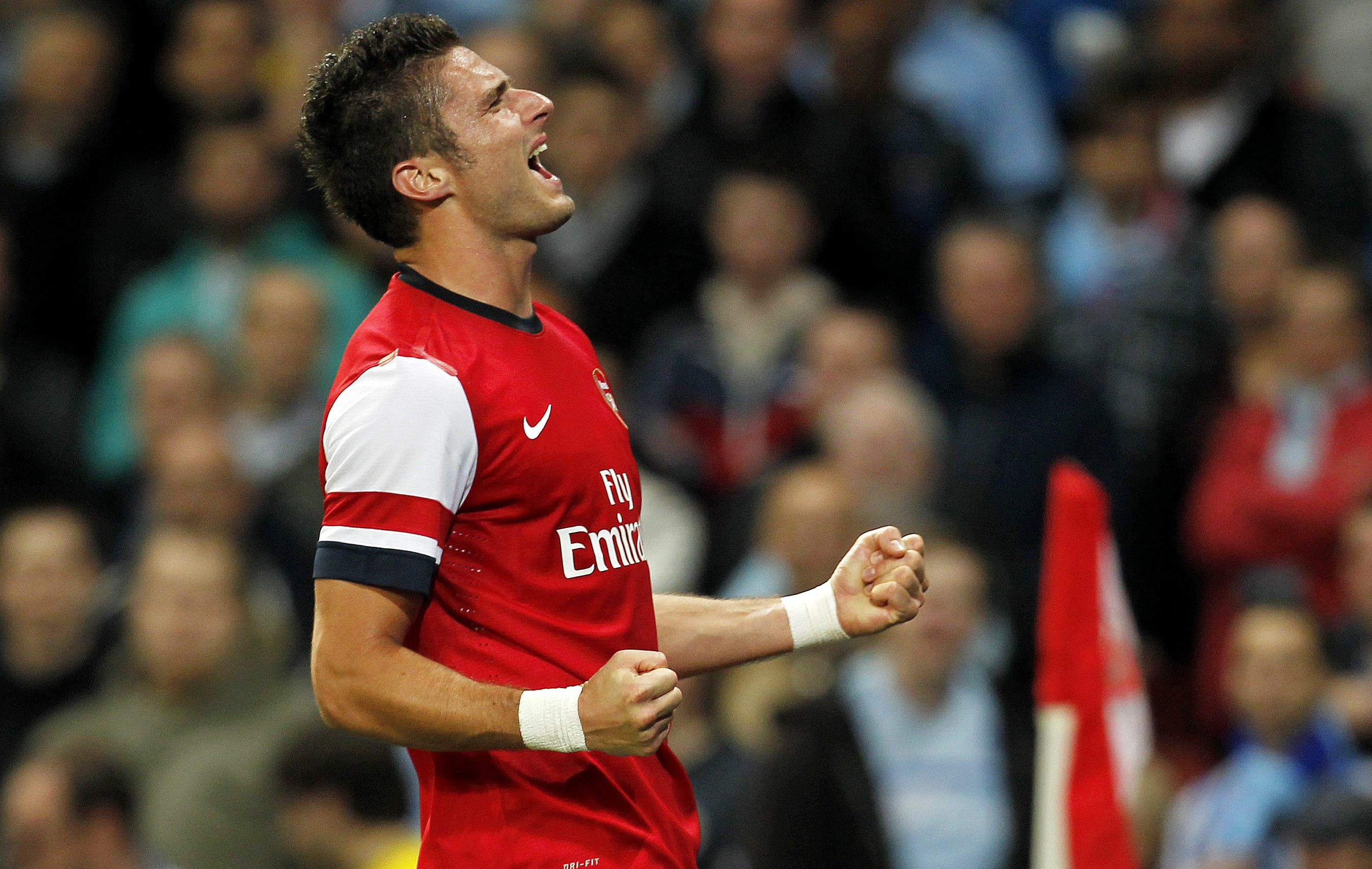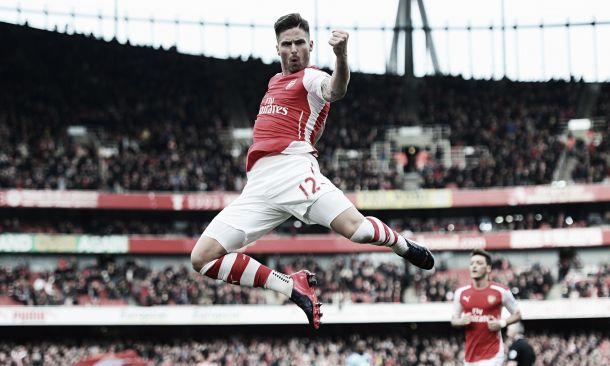Arsenal’s season came to a climatic end at Wembley last Sunday, defeating Aston Villa by four clear goals in the FA Cup final. This was to be the club’s 12th title in their illustrious history and their second in succession, having overcome Hull City the year before.
The latter eradicated the Gunners’ much famed trophy drought, spanning nine years following their 2005 FA Cup triumph over rivals Manchester United. Arsene Wenger’s men started poorly, conceding twice courtesy of James Chester and Curtis Davies. Goals from Santi Cazorla and Laurent Koscielny leveled the tie before Aaron Ramsey netted the winner in extra-time.
The performances from the victors held little parallels with the club seemingly learning from their slow start against the Tigers, dominating the 2015 final from start to finish. There did prove to be one positive correlation however, that being Olivier Giroud.
The Frenchman had a decisive hand in the concluding goals of both fixtures, assisting the third with a exquisitely executed backheel a season prior to scoring the fourth with a flick at the near post. This rounded off his most prolific campaign in a red shirt, rightly earning himself a place in VAVEL’s Arsenal Team of the Season.
Olivier Giroud joined Arsenal in 2012, signing from French champions Montpellier to ultimately replace the departing Robin van Persie. The striker arrived with Koln’s Lukas Podolski and Malaga’s Santi Cazorla, each hoping to recover the goals the team were losing in the form of their talismanic Dutchman.
Expectations were heavy and that can often prove too much for some players. Thierry Henry took eight games to score for the North London outfit, while Denis Bergkamp took nine before achieving stardom at Highbury and the Emirates. Giroud, however, took seven matches to score for the club and that came against League One Coventry City in a League Cup clash.

The ex-Tours man had no issues getting off the mark this season, expertly beating Manchester City goalkeeper Joe Hart in the Community Shield with a long range effort. This ensured the FA Cup holders lifted further silverware under the Wembley arch, defeating a lacklustre City side 3-0.
Joy for the forward, and for the club as a whole, would not last much longer. A nervy victory over Crystal Palace on the opening day of the Premier League season was preceded by battling draws with Besiktas and Everton respectively. Arsenal’s number 12 headed in an equaliser against the latter, converting a Nacho Monreal cross in the dying embers of the game.
The match proved pivotal for the 28-year-old, going down with an ankle issue that would ultimately rule the striker out until late November. Many fans questioned the manager’s decision to not delve into the transfer market and sign an adequate replacement, with no recognised centre-forward in the ranks barring a raw Yaya Sanogo, after the Gunners went on to win just three of their corresponding 10 games.
His return to first team football may have been more influential, had it not been for a Kieran Gibbs own goal and a late Wayne Rooney chip in a meeting with Manchester United at the Emirates. Coming on with just a quarter of an hour to play, Giroud unleashed an ineffable half volley from the periphery of the penalty box to eventually beat an impressive David De Gea between the sticks.
Although it proved to be a consolation, the goal was part of an impressive record in the most significant games of the season. Aforementioned strikes in the FA Cup and Community Shield finals came alongside a double over Liverpool and a header against Manchester City at the Etihad. This is in stark contrast to the previous campaign where the French international registered a solitary Premier League goal against the top seven, that coming in the first of three North London derbies in 2013-14.
Giroud’s lowest point of the year came in the Champions League encounter at home to Monaco. The targetman missed a plethora of opportunities against a seemingly inferior Ligue 1 side, as they lost 3-1 to Les Rouges et Blancs on the night. Arsene Wenger substituted his countryman on the hour mark after he missed as many as five chances, including a free header from seven-yards and a tap in from a similar distance.
Before a league game with Everton, he spoke out about his personal embarrassment following that first leg loss:
"It was difficult because nothing went right, everything was tough for me," he told the club’s official website. "I tried to keep focused but I understood why the boss wanted to substitute me. It was not my day.
"When you are a striker people expect more from you. I did well recently and scored a lot of goals, but when you miss chances it is like that - you have to question yourself.
"I will keep working hard and bounce back as soon as possible."
Redemption soon followed, scoring seven during his next seven games as Arsenal enjoyed an 11 game unbeaten run that stretched over three months. Due to this fantastic run of form that ultimately secured Champions League football for yet another year, the management team were reluctant to change the line-up and therefore, Giroud started 13 of the ensuing 16 fixtures.
Olivier Giroud’s strengths are there for all to see. His ability to bring others into play might possibly be his greatest asset, as he holds the ball up well and invites the attacking minded midfield players into the game. His backward passes are just short of equalling his forward passes in the Premier League this season, with the Frenchman creating 28 chances in the process. This statistic is typified by an abundance of well worked, team goals Giroud has been involved with in recent years such as marvellous Jack Wilshere and Tomas Rosicky goals last season.
In fact, despite strikes against Manchester City, Manchester United and Middlesbrough, his best goal of the campaign arguably came against West Ham. With his back towards goal and Cheikhou Kouyate just behind him, Giroud played a one-two with Mesut Ozil before collecting Aaron Ramsey’s pass, cutting inside and lashing the ball into the top corner of Adrian's net.
His aerial prowess was also on show, showcasing his physicality is well adapted to Premier League football with four headed goals and 99 aerial duels won. There has been a slight improvement in terms of headed goals as, although he scored the same amount last season, he did it in nine fewer games and 1212 fewer minutes.
A barren run before the FA Cup final not only lost him a starting spot at Wembley to Theo Walcott, but also opened the debate about whether he is good enough in front of goal to deliver Arsenal a fourth Premier League title. According to reports, forwards such as Jackson Martinez and Alexandre Lacazette have been on Wenger’s radar to challenge Giroud up front. This is not exclusive to his position though, with goalkeepers, centre-backs and defensive midfielders also being courted by the Londoners to help improve the strength of the squad.
Following the 4-0 thumping of Aston Villa, the attention of the players immediately turned towards topping the Premiership table in 12 months time. Giroud was one of these players, speaking to Sky Sports he stated:
“Now we can enjoy the FA Cup but next year we really want more. I have been at this club for three years now and it is an honour for me, we really want to start the season strongly and to join the title race. We want more.”
If the former Ligue 1 champion really does want to taste Premier League glory next term, he may find himself fighting for a place in the starting XI because winners improve every summer, with holders Chelsea already looking to bolster their squad in the shape of Radamel Falcao.
Whoever the Gunners bring in, if Giroud can stay fit and summon up some of the exemplary form he has shown this season, there is a strong possibility that he can fire Arsenal back into the title race when the new campaign starts in August.









































